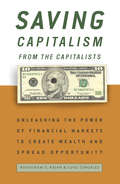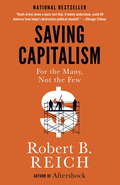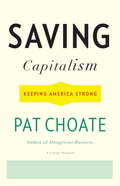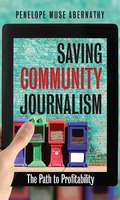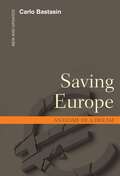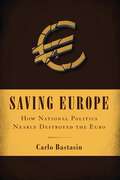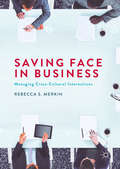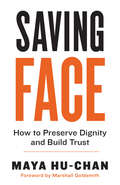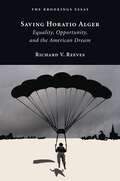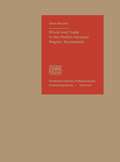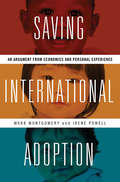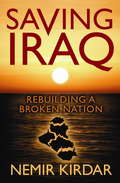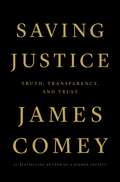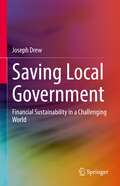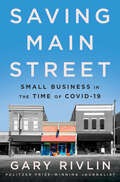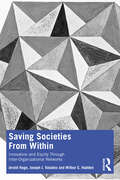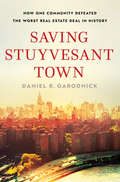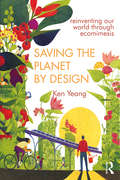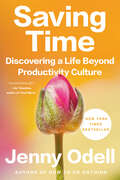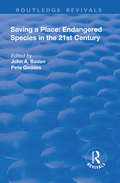- Table View
- List View
Saving Capitalism from the Capitalists: How Open Financial Markets Challenge the Establishment and Spread Prosperity to Rich and Poor Alike
by Raghuram Rajan Luigi ZingalesCapitalism’s biggest problem is the executive in pinstripes who extols the virtues of competitive markets with every breath while attempting to extinguish them with every action.Saving Capitalism from the Capitalists is a groundbreaking book that will radically change our understanding of the capitalist system, particularly the role of financial markets. They are the catalyst for inspiring human ingenuity and spreading prosperity. The perception of many, especially in the wake of never-ending corporate scandals, is that financial markets are parasitic institutions that feed off the blood, sweat, and tears of the rest of us. The reality is far different.•Vibrant financial markets threaten the sclerotic corporate establishment and increase corporate mobility and opportunity. They are the reason why entrepreneurship flourishes and companies like The Home Depot and Wal-Mart—mere fly specks a quarter of a century ago—have surged as they have.•They mean personal freedom and economic development for more people. Throughout history, and in most of the world today, the record is one of financial oppression. Elites restrict access to capital and severely limit not only general economic development but that of individuals as well.•Open borders help check the political and economic elites and preserve competitive markets. The greatest danger of the antiglobalization movement is that it will keep the rich rich and the poor poor. Globalization forces countries to do what is necessary to make their economies productive, not what is best for incumbent elites. Open borders limit the ability of domestic politics to close down competition and to retard financial and economic growth.•Markets are especially susceptible in economic downturns when the establishment can exploit public anger to restrict competition and access to capital. While markets must be free to practice “creative destruction,” Rajan and Zingales demonstrate the political and economic importance of a sustainable distribution of wealth and a baseline safety net. Capitalism needs a heart for its own good!There are no iron laws of economics that condemn countries like Bangladesh to perpetual poverty or the United States to perpetual prosperity. The early years of the twentieth century saw vibrant, open financial markets that were creating widespread prosperity. Then came the “Great Reversal” during the Great Depression. It can—and will—happen again, unless there is greater understanding of what markets do, who benefits, and who really wants to either limit them or shut them down.Saving Capitalism from the Capitalists breaks free of traditional ideological arguments of the right and left and points to a new way of understanding and spreading the extraordinary wealth-generating capabilities of capitalism.
Saving Capitalism from the Capitalists: Unleashing the Power of Financial Markets to Create Wealth and Spread Opportunity
by Raghuram G. Rajan Luigi ZingalesAnalysis of our Economy during the past century.
Saving Capitalism: For The Many, Not The Few
by Robert B. ReichFrom the author of Aftershock and The Work of Nations, his most important book to date--a myth-shattering breakdown of how the economic system that helped make America so strong is now failing us, and what it will take to fix it. Perhaps no one is better acquainted with the intersection of economics and politics than Robert B. Reich, and now he reveals how power and influence have created a new American oligarchy, a shrinking middle class, and the greatest income inequality and wealth disparity in eighty years. He makes clear how centrally problematic our veneration of the "free market" is, and how it has masked the power of moneyed interests to tilt the market to their benefit. Reich exposes the falsehoods that have been bolstered by the corruption of our democracy by huge corporations and the revolving door between Washington and Wall Street: that all workers are paid what they're "worth," that a higher minimum wage equals fewer jobs, and that corporations must serve shareholders before employees. He shows that the critical choices ahead are not about the size of government but about who government is for: that we must choose not between a free market and "big" government but between a market organized for broadly based prosperity and one designed to deliver the most gains to the top. Ever the pragmatist, ever the optimist, Reich sees hope for reversing our slide toward inequality and diminished opportunity when we shore up the countervailing power of everyone else. Passionate yet practical, sweeping yet exactingly argued, Saving Capitalism is a revelatory indictment of our economic status quo and an empowering call to civic action.From the Hardcover edition.
Saving Capitalism: Keeping America Strong
by Pat ChoateWhen the U.S. financial structure collapsed in fall 2008, it quickly became clear that our system of market capitalism was broken, endangered by decades of absolutist market dogma, shortsighted policies, and the abandonment of America's working people. Now, as the Obama administration seeks to repair the country's economy, one thing is clear: this crisis calls for drastic reforms. Regrettably, the government's response, so far, has been inadequate.In Saving Capitalism, economist and bestselling author Pat Choate offers six game-changing actions that can strengthen the U.S. economy now and stimulate long-term, self-sustaining, noninflationary economic growth that will create millions of better jobs. Here are proposals for:• Major tax reform• All-encompassing financial regulation• A strong social safety net• A major infrastructure program• Ways and means to balance U.S. trade with the rest of the world• The renewal of national innovationUrgent and provocative, Saving Capitalism is an accessible and informative dissection of the gravest threat our economy has faced since the Great Depression, and a bold and creative blueprint for the future.
Saving Community Journalism
by Penelope Muse AbernathyAmerica's community newspapers have entered an age of disruption. Towns and cities continue to need the journalism and advertising so essential to nurturing local identity and connection among citizens. But as the business of newspaper publishing collides with the digital revolution, and as technology redefines consumer habits and the very notion of community, how can newspapers survive and thrive? In Saving Community Journalism, veteran media executive Penelope Muse Abernathy draws on cutting-edge research and analysis to reveal pathways to transformation and long-term profitability. Offering practical guidance for editors and publishers, Abernathy shows how newspapers can build community online and identify new opportunities to generate revenue. Examining experiences at a wide variety of community papers--from a 7,000-circulation weekly in West Virginia to a 50,000-circulation daily in California and a 150,000-circulation Spanish-language weekly in the heart of Chicago--Saving Community Journalism is designed to help journalists and media-industry managers create and implement new strategies that will allow them to prosper in the twenty-first century. Abernathy's findings will interest everyone with a stake in the health and survival of local media.
Saving Disney
by Aaron M.G. Zimmerman Nancy Dean BeaulieuAt a March 2004 annual shareholder meeting, 45% of Walt Disney Co.'s shareholders withheld their support from CEO and Chairman Michael Eisner, producing a large no-confidence vote in the company's leader. The company had struggled financially in recent years and the board was widely believed to be beholden to Eisner. Two directors, Roy Disney and Stan Gold, resigned in protest of Eisner's leadership and the board's unwillingness to change. The two began to wage a PR battle calling for Eisner's removal and asking all shareholders to withhold their support from him at the upcoming shareholder meeting. Traces the history of Eisner's reign at the company and the events leading up to the March 3, 2004, shareholders meeting.
Saving Europe
by Carlo BastasinThree times in the few years since the global financial crisis erupted, the euro has come close to extinction, endangering both the world economy and history's most ambitious project in shared sovereignty. Yet each tim e, the case for a common currency proved to be more compelling than its weaknesses, and the euro survived. Saving Europe reveals how the nexus of international economics and national politics pushed monetary union to the brink of a breakup, how that disastrous development was avoided, and why the long-term viability of a common currency challenges politics as we know it.Carlo Bastasin reveals and analyzes what has been happening behind the scenes in European negotiations since the financial crisis began with the collapse of major financial institutions in 2008. He argues that the crisis in the euro zone actually has a political origin, having emerged from the self-interested abuses of national politics. Moreover, the crisis is reinforced even now by the obstinate defense of national prerogatives in politics and finance as well as by the lack of commitment for shared or supranational sovereignty. While the prevalent view is that monetary union was a flawed project from the start and is in need of amending, Bastasin shows that the failures have to do almost entirely with national opportunism--not only in Greece but in most countries, including Germany--and concludes that the crisis will lead to Europe's political union.Bastasin's work is an engrossing historical chronicle, interweaving moments of high drama with individual personalities on the world stage. German ChancellorAngela Merkel, French President Nicolas Sarkozy, and national and European central bankers, among others, play key roles. Saving Europe is also a rigorous attempt to make larger sense of what has happened in the euro zone and what might happen next. Given the central importance of Europe within the fragile world economy as well as growing speculation that the euro might disappear, this is essential reading for anyone trying to grasp international economics and politics. Just as important, it is a compelling tale of people, personalities, power, and money. There is no other book like it.
Saving Europe
by Carlo BastasinThree times in the few years since the global financial crisis erupted, the euro has come close to extinction, endangering both the world economy and history's most ambitious project in shared sovereignty. Yet each time, the case for a common currency proved to be more compelling than its weaknesses, and the euro survived. Saving Europe reveals how the nexus of international economics and national politics pushed monetary union to the brink of a breakup, how that disastrous development was avoided, and why the long-term viability of a common currency challenges politics as we know it.Carlo Bastasin reveals and analyzes what has been happening behind the scenes in European negotiations since the financial crisis began with the collapse of major financial institutions in 2008. He argues that the crisis in the euro zone actually has a political origin, having emerged from the self-interested abuses of national politics. Moreover, the crisis is reinforced even now by the obstinate defense of national prerogatives in politics and finance as well as by the lack of commitment for shared or supranational sovereignty. While the prevalent view is that monetary union was a flawed project from the start and is in need of amending, Bastasin shows that the failures have to do almost entirely with national opportunism-not only in Greece but in most countries, including Germany-and concludes that the crisis will lead to Europe's political union.Bastasin's work is an engrossing historical chronicle, interweaving moments of high drama with individual personalities on the world stage. German ChancellorAngela Merkel, French President Nicolas Sarkozy, and national and European central bankers, among others, play key roles. Saving Europe is also a rigorous attempt to make larger sense of what has happened in the euro zone and what might happen next. Given the central importance of Europe within the fragile world economy as well as growing speculation that the euro might disappear, this is essential reading for anyone trying to grasp international economics and politics. Just as important, it is a compelling tale of people, personalities, power, and money. There is no other book like it.
Saving Europe
by Carlo BastasinIn this gripping narrative, Carlo Bastasin reconstructs the main political decisions of the euro crisis, unveiling the hidden interests and the secret diplomacy behind the scene. The European dream was both the rejection of war and the creation of a new spirit of peaceful cooperation. Yet confrontation has been the hallmark of the euro crisis, and national opportunistic gimmicks have driven the awkward attempts to solve the crisis itself. Today, Europe is in a crisis of democracy, which Bastasin has dubbed, "the first War of Interdependence of the global age." Praise for the first edition of Saving Europe Bastasin does an admirable job in analysing the euro-zone's economic challenges and is a sure-footed guide through the seemingly endless European Union summit meetings that were supposed to resolve them. He also has an eye for the human detail that makes his sad account of institutional muddle surprisingly compelling. - Financial TimesBastasin's book is worth reading for its detailed political narrative of the eurozone crisis to date, focusing on the interaction among decision-makers in Europe's capitals. - Foreign AffairsA reconstruction that may be considered definitive. Revelations on the European negotiations are written with talent and go hand in hand with no-esoteric economic analysis and with the right amount of realism to reach the political substance. -Corriere della SeraAnyone looking for general knowledge and deeper understanding of the crisis, I can recommend a formidable analysis by Carlo Bastasin: Saving Europe. The author is a very unusual combination of a qualified economist and driven journalism. -Svenska Dagbladet
Saving Face in Business
by Rebecca S. MerkinThis book explains the subtle maneuvers of what researchers call "facework" and demonstrates the vital role it plays in the success or failure of cross-cultural interactions. Building on Geert Hofstede's seminal research on cultural dimensions, Merkin synthesizes more recent research in business, communication, cross-cultural psychology and sociology to offer a model for better understanding facework. Additionally, Merkin's model shows how particular communication strategies can facilitate more successful cross-cultural interactions. The first book of its kind to focus on the practical aspects of employing face-saving, it is a needed text for academics, students, and business professionals negotiating with organizations from different cultures.
Saving Face: How to Preserve Dignity and Build Trust
by Maya Hu-Chan"Maya Hu-Chan shares a blueprint for becoming a more empathetic, self-aware, and inclusive leader. Saving Face guides us to consider different perspectives, to think first and speak last, and to respect others above all else."—Frances Hesselbein, former CEO, Girl Scouts of the USA, and Presidential Medal of Freedom recipientOrganizations now need to attract, retain, and motivate teams and employees across distance, time zones, and cultural differences. Building authentic and lasting human relations may be the most important calling for leaders in this century. According to management and global leadership specialist Maya Hu-Chan, the concept of "saving face" can help any leader preserve dignity and create more empathetic cross-cultural relationships. "Face" represents one's self-esteem, self-worth, identity, reputation, status, pride, and dignity. Saving face is often understood as saving someone from embarrassment, but it's also about developing an understanding of the background and motivations of others to discover the unique facets we all possess. Without that understanding, we risk causing others to lose face without even knowing it. Hu-Chan explains saving face through anecdotes and practical tools, such as her BUILD leadership model (Benevolence, Understanding, Interacting, Learning, and Delivery). This book illustrates how we can give face to create positive first impressions, avoid causing others to lose face, and, most importantly, build trust and lasting relationships inside and outside the workplace.
Saving Horatio Alger
by Richard V. ReevesTHE BROOKINGS ESSAY: In the spirit of its commitment to high-quality, independent research, the Brookings Institution has commissioned works on major topics of public policy by distinguished authors, including Brookings scholars. The Brookings Essay is a multi-platform product aimed to engage readers in open dialogue and debate. The views expressed, however, are solely those of the author. Available in ebook only.
Saving International Adoption: An Argument from Economics and Personal Experience
by Mark Montgomery Irene PowellInternational adoption is in a state of virtual collapse, rates having fallen by more than half since 2004 and continuing to fall. Yet around the world millions of orphaned and vulnerable children need permanent homes, and thousands of American and European families are eager to take them in. Many government officials, international bureaucrats, and social commentators claim these adoptions are not "in the best interests" of the child. They claim that adoption deprives children of their "birth culture," threatens their racial identities, and even encourages widespread child trafficking. Celebrity adopters are publicly excoriated for stealing children from their birth families.This book argues that opposition to adoption ostensibly based on the well-being of the child is often a smokescreen for protecting national pride. Concerns about the harm done by transracial adoption are largely inconsistent with empirical evidence. As for trafficking, opponents of international adoption want to shut it down because it is too much like a market for children. But this book offers a radical challenge to this view—that is, what if instead of trying to suppress market forces in international adoption, we embraced them so they could be properly regulated? What if the international system functioned more like open adoption in the United States, where birth and adoptive parents can meet and privately negotiate the exchange of parental rights? This arrangement, the authors argue, could eliminate the abuses that currently haunt international adoption.The authors challenge the prevailing wisdom with their economic analyses and provocative analogies from other policy realms. Based on their own family's experience with the adoption process, they also write frankly about how that process feels for parents and children.
Saving International Adoption: An Argument from Economics and Personal Experience
by Mark Montgomery Irene PowellChoice Outstanding Academic Title of 2018 International adoption is in a state of virtual collapse, rates having fallen by more than half since 2004 and continuing to fall. Yet around the world millions of orphaned and vulnerable children need permanent homes, and thousands of American and European families are eager to take them in. Many government officials, international bureaucrats, and social commentators claim these adoptions are not "in the best interests" of the child. They claim that adoption deprives children of their "birth culture," threatens their racial identities, and even encourages widespread child trafficking. Celebrity adopters are publicly excoriated for stealing children from their birth families. This book argues that opposition to adoption ostensibly based on the well-being of the child is often a smokescreen for protecting national pride. Concerns about the harm done by transracial adoption are largely inconsistent with empirical evidence. As for trafficking, opponents of international adoption want to shut it down because it is too much like a market for children. But this book offers a radical challenge to this view—that is, what if instead of trying to suppress market forces in international adoption, we embraced them so they could be properly regulated? What if the international system functioned more like open adoption in the United States, where birth and adoptive parents can meet and privately negotiate the exchange of parental rights? This arrangement, the authors argue, could eliminate the abuses that currently haunt international adoption. The authors challenge the prevailing wisdom with their economic analyses and provocative analogies from other policy realms. Based on their own family's experience with the adoption process, they also write frankly about how that process feels for parents and children.
Saving Iraq: Rebuilding A Broken Nation
by Nemir KirdarNemir Kirdar has lived Iraq's history. From the country of his youth - a stable and vibrant land of great promise, to the 1958 coup that plunged Iraq into a period of terror and destruction, foreign occupation, and the fall of Saddam Hussein, he's been uniquely placed to comment on events and propose solutions.Now Kirdar shares his vision for tomorrow's Iraq, providing a blueprint for political, economic and social renewal. Calling for Iraqis to rise up and unlock their nation's potential, Kirdar affirms that Iraq can again be unified. SAVING IRAQ is a personal account but also a book of global significance, offering steps towards resolution in a shattered country.
Saving Iraq: Rebuilding a Broken Nation
by Nemir KirdarNemir Kirdar has lived Iraq's history. From the country of his youth - a stable and vibrant land of great promise, to the 1958 coup that plunged Iraq into a period of terror and destruction, foreign occupation, and the fall of Saddam Hussein, he's been uniquely placed to comment on events and propose solutions.Now Kirdar shares his vision for tomorrow's Iraq, providing a blueprint for political, economic and social renewal. Calling for Iraqis to rise up and unlock their nation's potential, Kirdar affirms that Iraq can again be unified. SAVING IRAQ is a personal account but also a book of global significance, offering steps towards resolution in a shattered country.
Saving Justice: Truth, Transparency, and Trust
by James ComeyJames Comey, former FBI Director and New York Times bestselling author of A Higher Loyalty, uses his long career in federal law enforcement to explore issues of justice and fairness in the US justice system.James Comey might best be known as the FBI director that Donald Trump fired in 2017, but he’s had a long, varied career in the law and justice system. He knows better than most just what a force for good the US justice system can be, and how far afield it has strayed during the Trump Presidency. In his much-anticipated follow-up to A Higher Loyalty, Comey uses anecdotes and lessons from his career to show how the federal justice system works. From prosecuting mobsters as an Assistant US Attorney in the Southern District of New York in the 1980s to grappling with the legalities of anti-terrorism work as the Deputy Attorney General in the early 2000s to, of course, his tumultuous stint as FBI director beginning in 2013, Comey shows just how essential it is to pursue the primacy of truth for federal law enforcement. Saving Justice is gracefully written and honestly told, a clarion call for a return to fairness and equity in the law.
Saving Local Government: Financial Sustainability in a Challenging World
by Joseph DrewThis book focuses squarely on the problem of saving local government in the context of extraordinary financial challenges being faced across the globe. Saving Local Government is written principally for practitioners and employs a ‘conversational’ tone which makes complex theory both engaging and accessible. It augments world-best scholarship with Professor Joseph Drew’s extensive practical experience in guiding local governments away from the brink of financial insolvency. It is thus a ‘must read’ for local government executives, Mayors, Councillors and the regulators that oversee the sector.In Saving Local Government Professor Drew also makes a number of important contributions to address significant gaps in the scholarly literature. In particular, the book includes extensive treatment of de-amalgamation, applied natural law philosophy, Aristotelian epistemology for evaluating public policy success, as well as alternatives to financial administration. The work is therefore also compelling reading for scholars.
Saving Main Street: Small Business in the Time of COVID-19
by Gary RivlinA veteran journalist follows an inspiring ensemble cast of small business owners fighting to keep their businesses alive through Covid-19, while exploring the sweeping trends and government policies that had brought small businesses to the breaking point long before the coronavirus hit.There is a tendency to fetishize small business even as it shrinks before our eyes. Americans extol the virtues of small, local, often family-run shops, yet buy from big-box retailers and chains that dominate the competition. Even before the pandemic, small businesses seemed endangered. When Covid-19 hit, the resounding question was: How will they be able to survive this?Saving Main Street is an unfiltered, up-close examination of a small group of business owners and their employees, their struggles, and their strategies to survive. It is an eye-opening tale of grit, perseverance, and entrepreneurial spirit that follows three businesses: a restaurant owner and his rambunctious staff, an immigrant running her own hair salon, and the owner of a “non-life sustaining” gift shop—alongside a larger cast of vividly drawn characters. Gary Rivlin focuses on the first days of the Covid lockdown and the ensuing eighteen months of chaos, including the personal and financial risks, a contentious presidential election, and contradictory governmental guidelines—all which compounded the everyday challenges of running an independent business trying to attract and retain customers who expect low prices, convenience, and endless choice. Rivlin keenly observes small businesses from all angles, examining commonly held “myths”; contradictions in government policy; enormous racial and class fissures; a national self-identity intrinsically connected to the ideal of small business, and how the decline of this American way of retail impacts our notions of American exceptionalism, community, and civic duty.As Rivlin reveals, there’s something enduring about small business in the American psyche. Life will have changed in unprecedented ways on the other side of this pandemic, yet hard times will also create opportunities, offering hope and survival.
Saving Social Security: A Balanced Approach
by Peter A. Diamond Peter R. OrszagDiscusses options for addressing the problems facing the Social Security program.
Saving Societies From Within: Innovation and Equity Through Inter-Organizational Networks
by Jerald Hage Joseph J. Valadez Wilbur C. HaddenMoving beyond existing models from economics and political science, this book shows how crises in capitalism and democracy can be solved with Systemic coordinated inter-organizational networks.It offers a new model of societal coordination that builds cooperation and trust while solving today’s modern and complex practical problems: Systemic coordinated inter-organizational networks (SCIONs). It details how SCIONs can quickly catalyze organizational change among interorganizational network members while providing a general framework for characterizing individual and organizational change. The chapters apply these theoretical ideas in an epic case study of the rebuilding of the health care system in rural Nicaragua after a major natural disaster (Hurricane Mitch). They provide lessons for public health program managers while contributing to the literatures on modes of coordination and on social capital.The book is a vital text for upper-division courses on management, inter-organizational collaboration, crisis management and public health.
Saving Stuyvesant Town: How One Community Defeated the Worst Real Estate Deal in History
by Daniel R. GarodnickFrom city streets to City Hall and to Midtown corporate offices, Saving Stuyvesant Town is the incredible true story of how one middle class community defeated the largest residential real estate deal in American history. Lifetime Stuy Town resident and former City Councilman Dan Garodnick recounts how his neighbors stood up to mammoth real estate interests and successfully fought to save their homes, delivering New York City's biggest-ever affordable housing preservation win. In 2006, Garodnick found himself engaged in an unexpected battle. Stuyvesant Town was built for World War II veterans by MetLife, in partnership with the City. Two generations removed, MetLife announced that it would sell Stuy Town to the highest bidder. Garodnick and his neighbors sprang into action. Battle lines formed with real estate titans like Tishman Speyer and BlackRock facing an organized coalition of residents, who made a competing bid to buy the property themselves. Tripped-up by an over-leveraged deal, the collapse of the American housing market, and a novel lawsuit brought by tenants, the real estate interests collapsed, and the tenants stood ready to take charge and shape the future of their community. The result was a once-in-a-generation win for tenants and an extraordinary outcome for middle-class New Yorkers.Garodnick's colorful and heartfelt account of this crucial moment in New York City history shows how creative problem solving, determination, and brute force politics can be marshalled for the public good. The nine-year struggle to save Stuyvesant Town by these residents is an inspiration to everyone who is committed to ensuring that New York remains a livable, affordable, and economically diverse city.
Saving The Planet By Design: Reinventing Our World Through Ecomimesis
by Ken YeangCan we ‘save the Planet’? For a resilient, durable and sustainable future for human society, we need to repurpose, reinvent, redesign, remake and recover our human-made world so that our built environment is benignly and seamlessly biointegrated with Nature to function synergistically with it. These are the multiple tasks that humanity must carry out imminently if there is to be a future for human society and all lifeforms and their environments on the Planet. Addressing this is the most compelling question for those whose daily work impacts on Nature, such as architects, engineers, landscape architects, town planners, environmental policy makers, builders and others, but it is a question that all of humanity needs to urgently address. Presented here are two key principles as the means to carry out these tasks – ‘ecocentricity’ being guided by the science of ecology, and ‘ecomimesis’ as designing and making the built environment including all artefacts based on the emulation and replication of the ‘ecosystem’ concept. Designing with ecology is contended here as the authentic approach to green design from which the next generation of green design will emerge, going beyond current use of accreditation systems. For those who subscribe to this principle, this is articulated here, showing how it can be implemented by design. Adopting these principles is fundamental in our endeavour to save our Planet Earth, and changes profoundly and in entirety the way we design, make, manage and operate our built environment.
Saving Time: Discovering a Life Beyond the Clock
by Jenny OdellWe are living on the wrong clock, and it is destroying us. The New York Times bestselling author of How to Do Nothing offers us different ways to experience time in this dazzling, subversive, and deeply hopeful book. <p><p>In her first book, How to Do Nothing, Jenny Odell wrote about the importance of disconnecting from the “attention economy” to spend time in quiet contemplation. But what if you don’t have time to spend? <p><p>In order to answer this seemingly simple question, Odell took a deep dive into the fundamental structure of our society and found that the clock we live by was built for profit, not people. This is why our lives, even in leisure, have come to seem like a series of moments to be bought, sold, and processed ever more efficiently. Odell shows us how our painful relationship to time is inextricably connected not only to persisting social inequities but to the climate crisis, existential dread, and a lethal fatalism. <p><p>This dazzling, subversive, and deeply hopeful book offers us different ways to experience time—inspired by pre-industrial cultures, ecological cues, and geological timescales—that can bring within reach a more humane, responsive way of living. As planet-bound animals, we live inside shortening and lengthening days alongside gardens growing, birds migrating, and cliffs eroding; the stretchy quality of waiting and desire; the way the present may suddenly feel marbled with childhood memory; the slow but sure procession of a pregnancy; the time it takes to heal from injuries. Odell urges us to become stewards of these different rhythms of life in which time is not reducible to standardized units and instead forms the very medium of possibility. <p><p>Saving Time tugs at the seams of reality as we know it—the way we experience time itself—and rearranges it, imagining a world not centered on work, the office clock, or the profit motive. If we can “save” time by imagining a life, identity, and source of meaning outside these things, time might also save us. <p> <b>New York Times Bestseller</b>
Saving a Place: Endangered Species in the 21st Century
by John A. Baden Pete GeddesThis title was first published in 2000: The noble goals embodied in the Endangered Species Act are colliding with financial and social realities. Citizens increasingly face the costs of current policies, while initiatives which fail to respect liberty and property meet serious resistance at every turn. Despite widespread verbal support for saving species ’at any cost’, when trade-offs become obvious, and values compete, support for these policies evaporates. This edited collection examines ethically and materially responsible approaches to this problem, written by leading international figures from a variety of disciplines. The result is the most comprehensive and constructive analysis of the effectiveness and viability of endangered species protection available.
